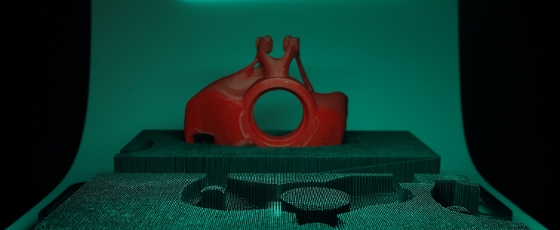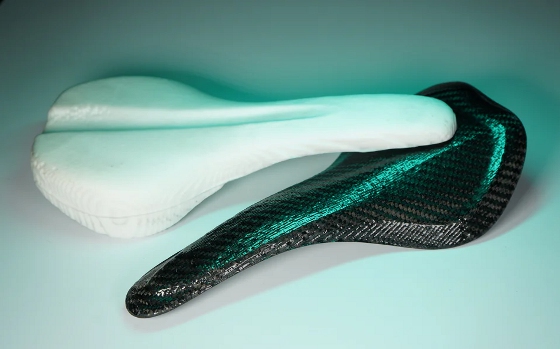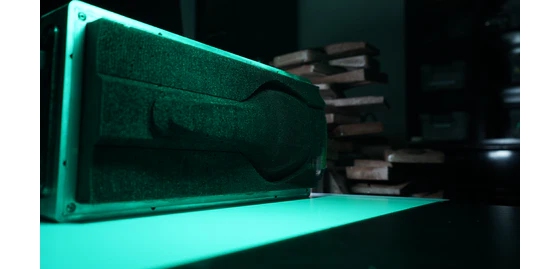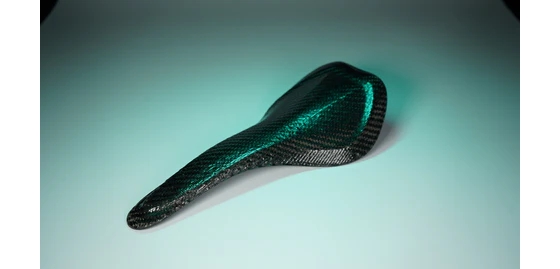 |
| September 17, 2024 | Volume 20 Issue 35 |
Designfax weekly eMagazine
Archives
Partners
Manufacturing Center
Product Spotlight
Modern Applications News
Metalworking Ideas For
Today's Job Shops
Tooling and Production
Strategies for large
metalworking plants
New infinitely reconfigurable and reusable mold tech

PolyMorphic molding using Fyous technology [Credit: Image courtesy of Fyous]
By Designfax
UK-based company Fyous (pronounced "fuse") is launching what it is calling the world's first, infinitely reusable molding technology that can shapeshift in under 20 minutes, producing zero tooling waste and making usable parts 14 times faster than 3D printing. Sort of like a kid's pin art toy, Fyous' PolyMorphic molding can be set, used, and then reset to help create molds for parts from carbon fiber, polyurethane, PET sheet (thermoformed), ABS, and more. It also can be used with foods like chocolate. PolyMorphic molding can be used to create custom workholding pieces too.
Fyous will be formally launching the product at Formnext in Germany at the end of November. This will be the first public showing of the shapeshifting, pin-tooling technology, which was devised and engineered by Fyous co-founders Joshua Shires and Thomas Bloomfield. PolyMorphic molding features more than 28,000 densely packed pins that create the mold. Fyous says once the pins are in position, the mold can withstand six tons of distributed pressure.
EDITOR'S NOTE: Please watch this Fyous video. Lots of questions about this tech are answered here.
With reusable pin tooling, manufacturers no longer have to store molds, fixtures, jigs, or workholding pieces, and besides reducing the waste generated through tooling changes, PolyMorphic molding can also produce faster production times compared to 3D printing and traditional mold-making, in many cases.
The Fyous machine uses the same type of CAD files used for 3D printing to make the molds. The Fyous proprietary software calculates all the pin positions for a given 3D model surface. Input a 3D CAD model, and the Fyous software generates the PolyMorphic mold shape by actuating all the pins, moving them rapidly into position to create a fixed geometry. The mold is set to make a part.
On completion of the part, the PolyMorphic mold is returned to the machine, ready for the next shapeshift. Product manufacture could be anything you typically use a mold for: vacuum forming, foam casting, food production, or composite layup, just to name a few.
"Using PolyMorphic molding to rapidly create accurate molds for tooling will reduce time to market for a huge array of products, plus unlock commercial viability for desirable products which currently have no cost-effective manufacture method," says Shires. "Our mission is to deliver this disruption whilst reducing environmental impact. PolyMorphic molding is a zero-waste technology where raw materials are conserved and the molds can be used again and again. We will remove not only physical waste in the form of materials and tooling, but also remove wasted time by accelerating product development, prototyping, and manufacture efficiencies."
"The new technology can generate products up to 14 times faster than conventional 3D printing methods, with zero waste," says Bloomfield. Because PolyMorphic molding supports a wide array of materials and processes, including molding and casting, vacuum forming, and composite layup, the technology's versatility "makes its possible applications almost limitless," he adds.
Much like when 3D printing was developed, the applications it could potentially be used for were unknown by its inventors. The Fyous team is now undertaking this period of discovery with PolyMorphic molding, uncovering potential applications at an exponential rate."
Designfax asked the Fyous team about post-processing of parts made using the new mold tech, since the pin mold may not leave a smooth surface finish. Guy Robb, a Fyous company rep, says, "If you're making a part by vacuum molding that won't be visible, then there will be minimal post-processing. If you want a highly finished surface, then there would need to be some filling and polishing, similar to what would be needed for injection-molded or 3D-printed parts."
"Products made via PolyMorphic molding will have a pimply surface texture like a golf ball," says Robb, "so if you need the surface to be really smooth, then some post-processing would be necessary. Alternatively, if you are making molds for a small production run, then you can 3D print and polish a skin to sit on top of the pins. This will mean the end product is smooth."
EXAMPLE: Bike seat

A bike saddle seat design required parts to be made from two materials (carbon fiber and PU foam) with two different designs, but only one PolyMorphic mold from Fyous was used. [Credit: Image courtesy of Fyous]
One good example project featured on the Fyous case studies section available online is a high-performance bike saddle seat made of carbon fiber and a PU (polyurethane) foam. The seat has two main components that normally would require two separate molds -- one for the carbon fiber part and one for the PU foam part.

Fyous PolyMorphic mold set for bike saddle seat part. [Credit: Image courtesy of Fyous]

Bike saddle seat made with carbon fiber using PolyMorphic mold tech from Fyous. [Credit: Image courtesy of Fyous]
PolyMorphic molding allows you to make both parts from the same piece of tooling rapidly with zero tooling waste. Fyous says its PolyMorphic molding made both molds/tooling in 60 minutes. "The foam was cast, and the carbon was laid up and left to cure for 3 hours under a vacuum at 60 degrees and then left for another 12 hours," according to the case study.
Specs
According to the Fyous website, the working volume for the Fyous machine is X = 350 mm, Y = 155 mm, and Z = 45 mm. Forming time is max 22 min. The smallest feature size is 2.2 mm. Max holding force in Z axis (distributed) is 6,000 kg. Machine footprint is X = 1,500 mm, Y = 1,000 mm, and X = 2,000 mm.
Want to find out what Fyous technology can do for your projects? Learn more at fyous.com. The company is planning on having its technology available in the United States.
Source: Fyous
Published September 2024
Rate this article
View our terms of use and privacy policy
